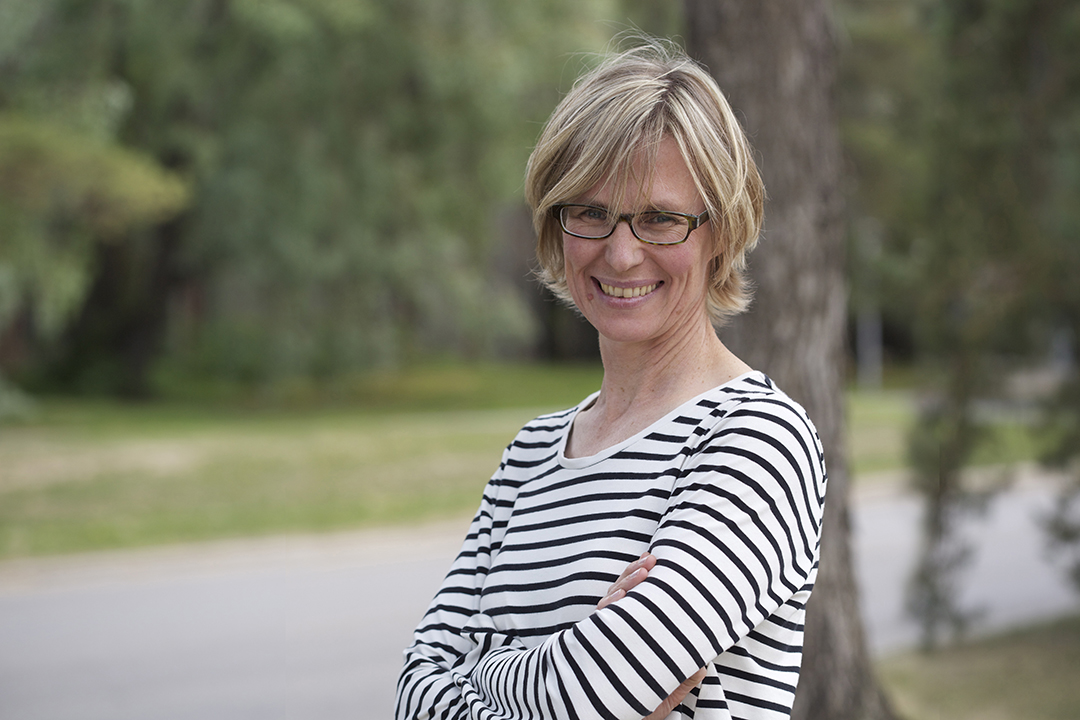
Dean's role natural progression for WCVM graduate
After 25 years, Dr. Gillian Muir is ready and well prepared for her newest role — acting dean of the Western College of Veterinary Medicine (WCVM).
By Katie Brickman-Young“I am excited about being a part of the college’s future in this role,” says Muir.
She began her new role on July 1 after the college’s previous dean, Dr. Douglas Freeman, stepped down for personal reasons.
Originally from Calgary, Alta., Muir received her Doctor of Veterinary Medicine (DVM) from the WCVM in 1988 and completed two years of graduate studies at the University of Saskatchewan (USask) before earning her PhD degree in neuroscience at the University of British Columbia.
She is the first WCVM graduate and female to be named dean of the western Canadian veterinary college, something she feels goes hand in hand.
“When we started studying in 1984, that was the first class with more female students than male students,” she says. “It was a change in veterinary medicine that happened in many places around that time and we haven’t looked back since.”
Muir feels it is a natural progression for her as she has moved from a faculty member to department head as well as interim associate dean (research) for a term. She has also been a vital voice and resource as the WCVM recalibrates its DVM degree program to reflect the move toward the use of competency-based curriculums in accredited veterinary colleges across North America. The college’s first-year students will be the first group to use the revamped curriculum.
“I’ve been involved in curriculum planning for many years. We are changing what we do in order to keep up with what we’ve now know about how students learn,” she says. “This is the start of the new first-year program that we’ve been developing for over a year now and I am excited to see how that goes.”
Muir loves to teach, and she was the WCVM recipient of the USask Provost’s College Award for Outstanding Teaching in 2016. She teaches neuroscience, a first-year course that she will continue to instruct in the winter term. She’s looking forward to connecting with students in that setting, even with the added responsibilities of being acting dean.
As Muir settles into the new role, she’s excited about many aspects of what should be an interesting —albeit challenging — year.
“There are a lot of challenges that we will be facing this year and we are all going to learn from it — it’s exciting,” she says.
One of those big changes is opening its veterinary program to international students, beginning in the fall of 2021. Muir is also excited about the potential for introducing new programs and moving forward with elements of the college’s strategic plan.
“When I look at the college, I see it as so much more than just veterinary education. We run a teaching hospital and share ownership of a diagnostic lab. We’re also strong partners in centres for toxicology, wildlife health and disease surveillance, VIDO-InterVac (Vaccine and Infectious Disease Organization-International Vaccine Centre) and the new Livestock and Forage Centre of Excellence,” says Muir.
“I’m looking forward to making the most of what this college has to offer. I want to see our students get the best education they can.”
Muir is aware of the many challenges that are present for this year, particularly those associated with the COVID-19 pandemic and how it’s changing the way the college interacts with students, faculty and staff. It’s also created many hurdles for the clinical teams to overcome in the WCVM Veterinary Medical Centre (VMC).
“How we operate this fall will have challenges. I talk about all the great things we are going to learn from it [the pandemic], but we have to go through it first,” she says. “I think my job in this … is to support the students, as well as we can [and to] support our instructors, faculty and our staff in the VMC — they are all working extremely hard.”
Building and maintaining partnerships will be a key component of Muir’s role as dean, and as someone who has connections in all western provinces, Muir is excited to build and collaborate with different stakeholders over the coming months. Those stakeholders include the provinces of Saskatchewan, British Columbia and Manitoba — the college’s three main funding partners.
All three provinces, along with USask, announced on Sept. 9 a new Interprovincial Agreement (IPA) that reaffirms the partner’s financial support and the college’s commitments to the provinces over the next five years.
“It is so important that we maintain and build those relationships with our stakeholders,” says Muir. She adds that her 25 years of experience as a WCVM faculty member will help her make more connections.
“We’ve put veterinarians across Western Canada, and I will have been in vet school with them or taught many of them.”
Muir can’t wait to see what the WCVM achieves over the coming years. She notes that she couldn’t have done it without the support of her colleagues, the college’s leadership team and her family.
“I have three teenagers now, and they are very proud of me for taking on this role,” she says. “Everyone in the college, USask and across the province have been very supportive. Together, I know we are going to finish this year stronger than we started.”
